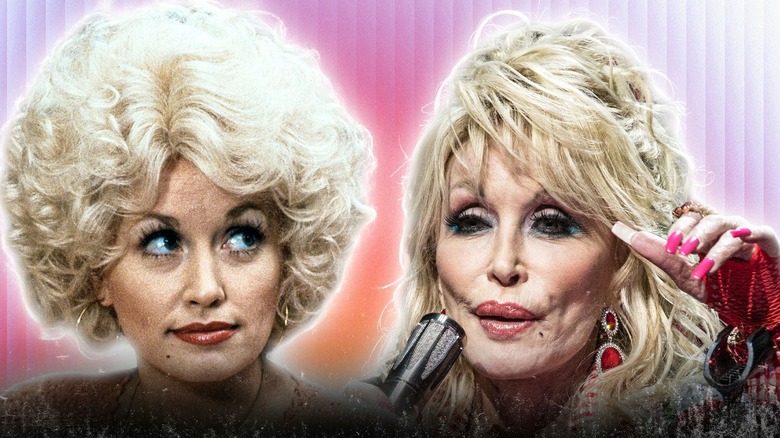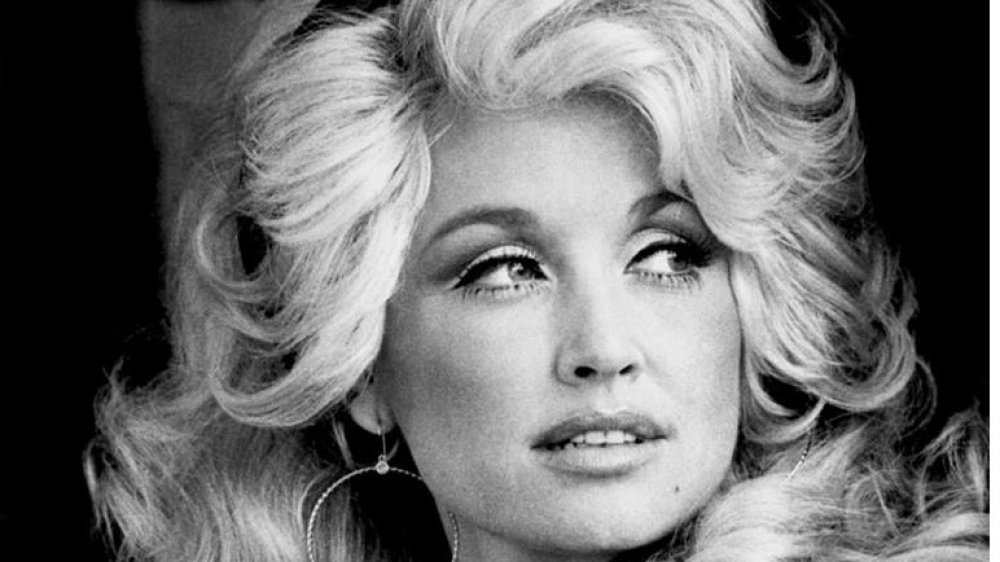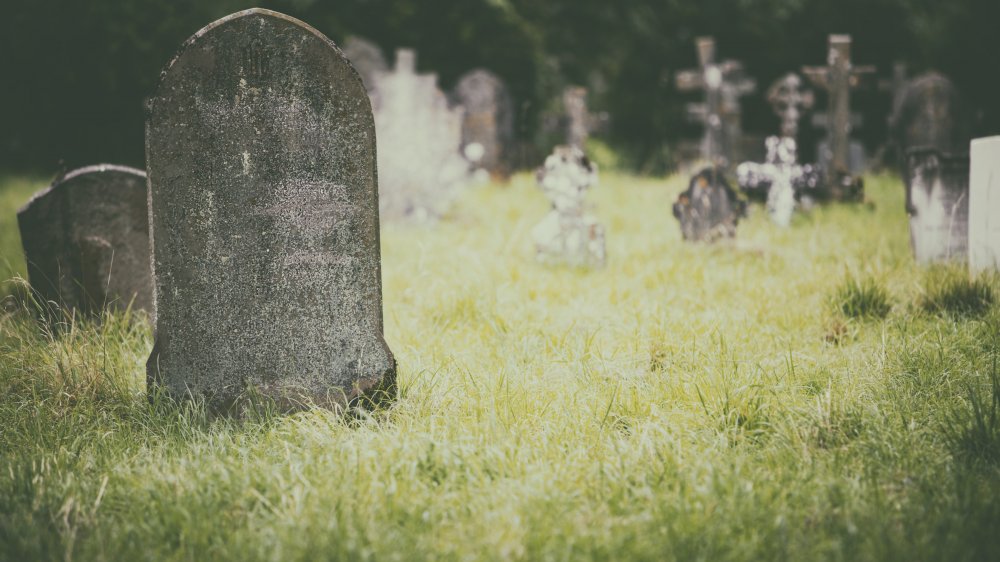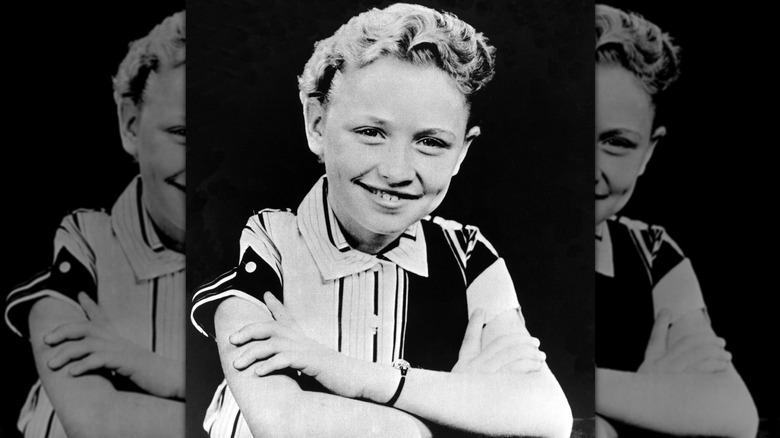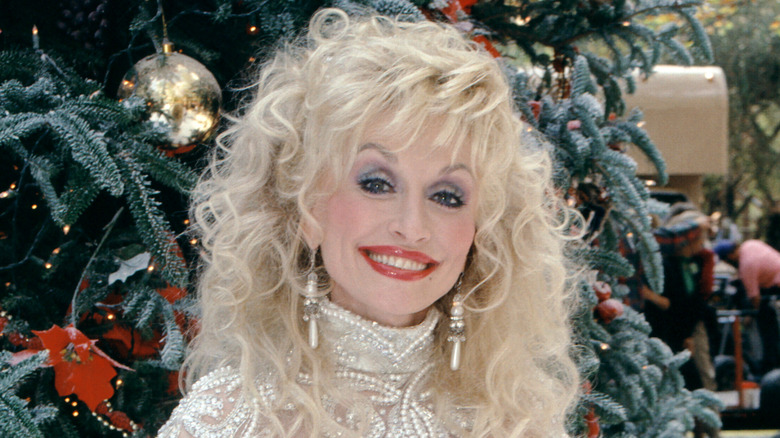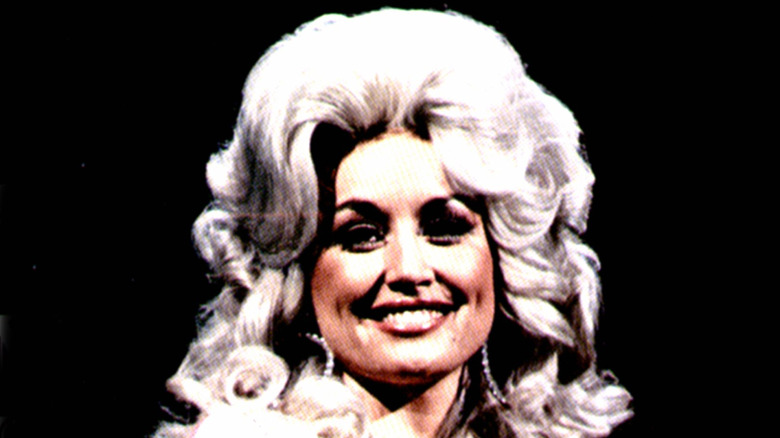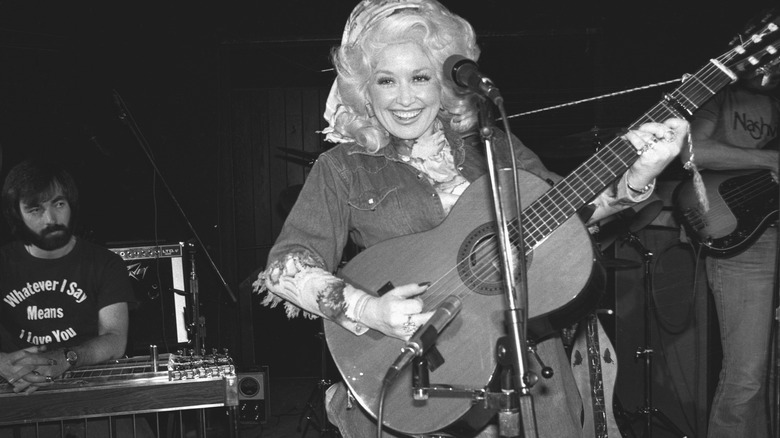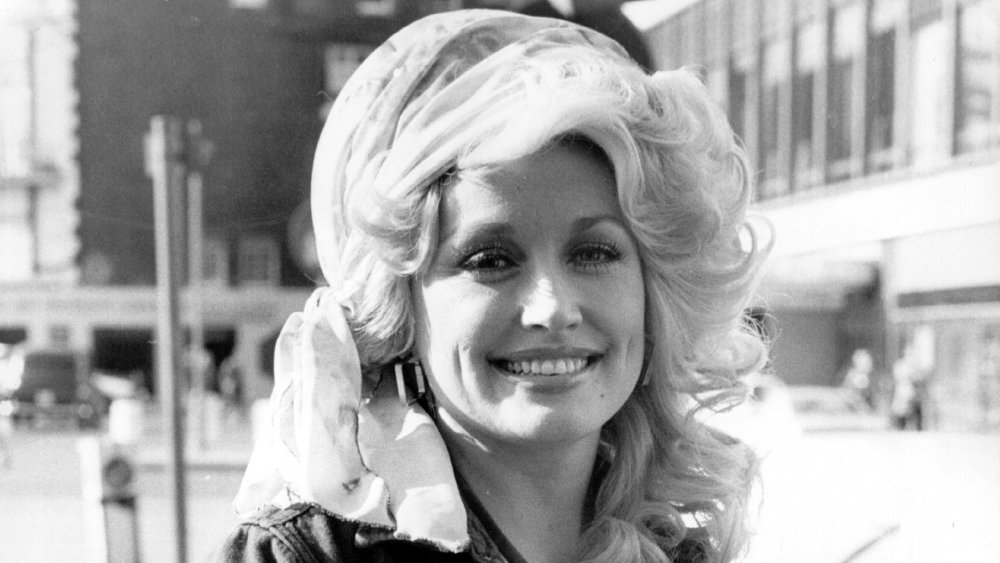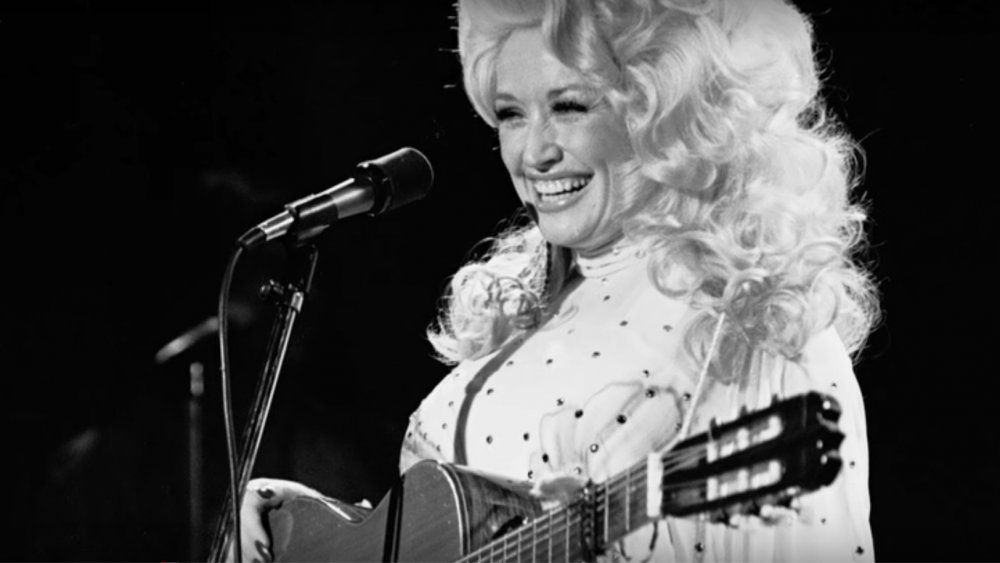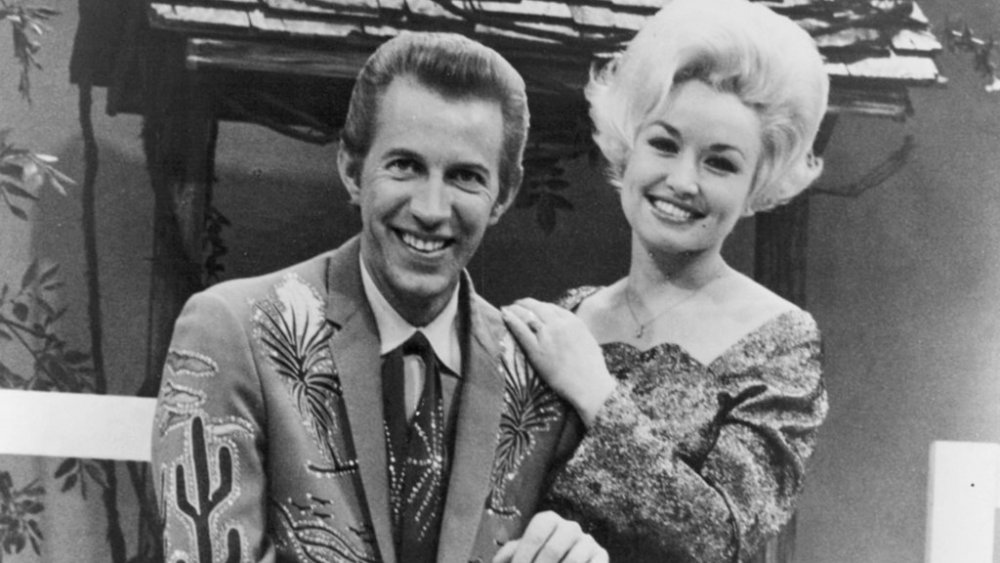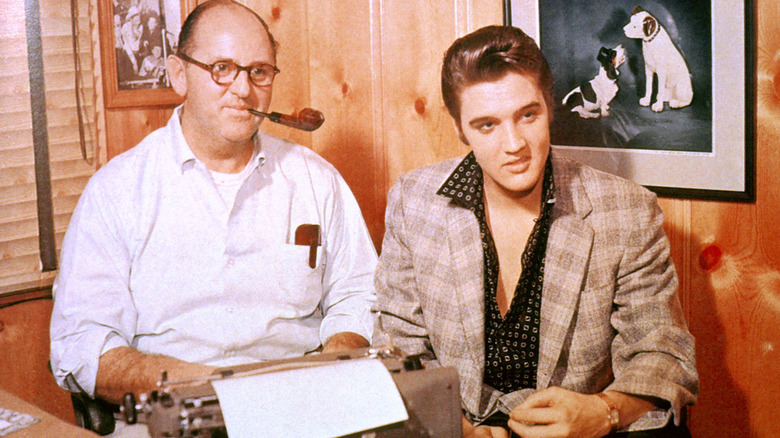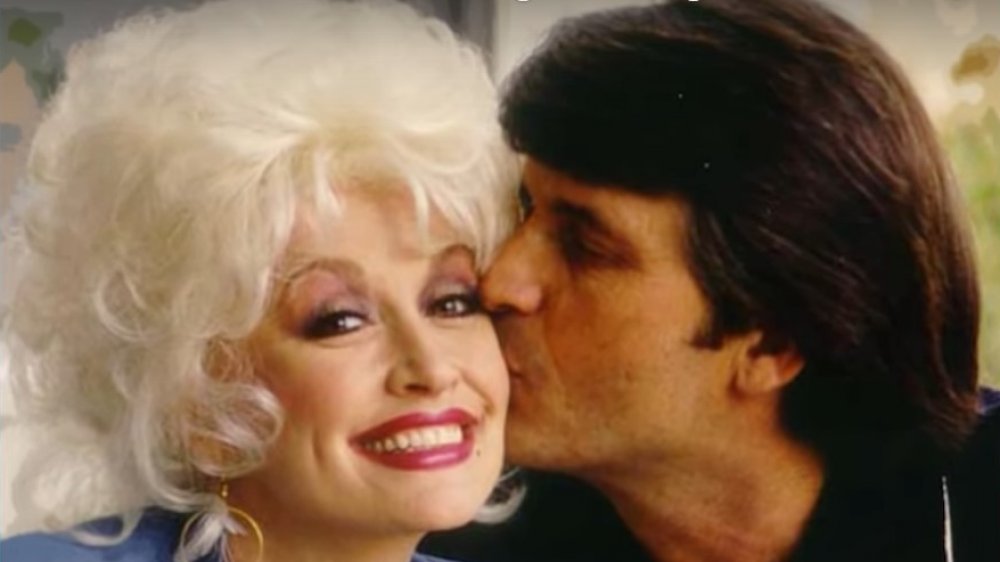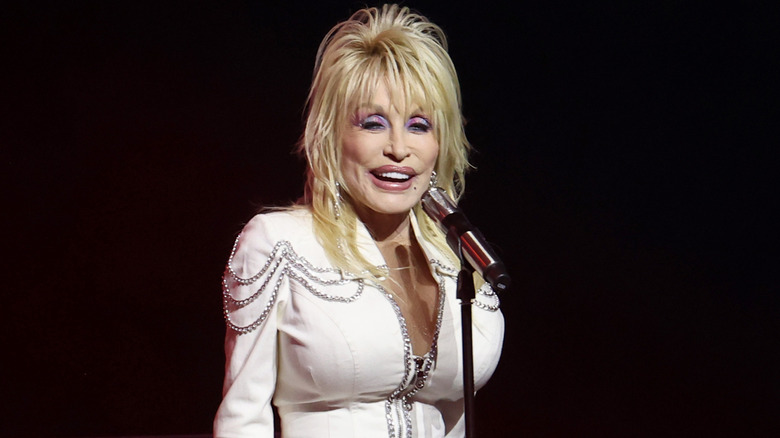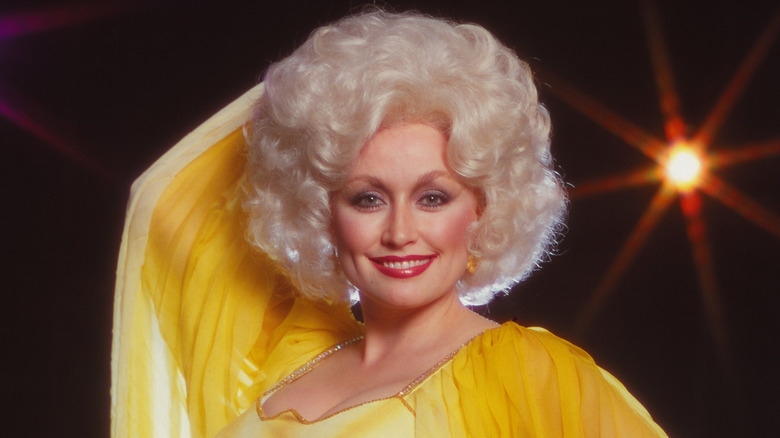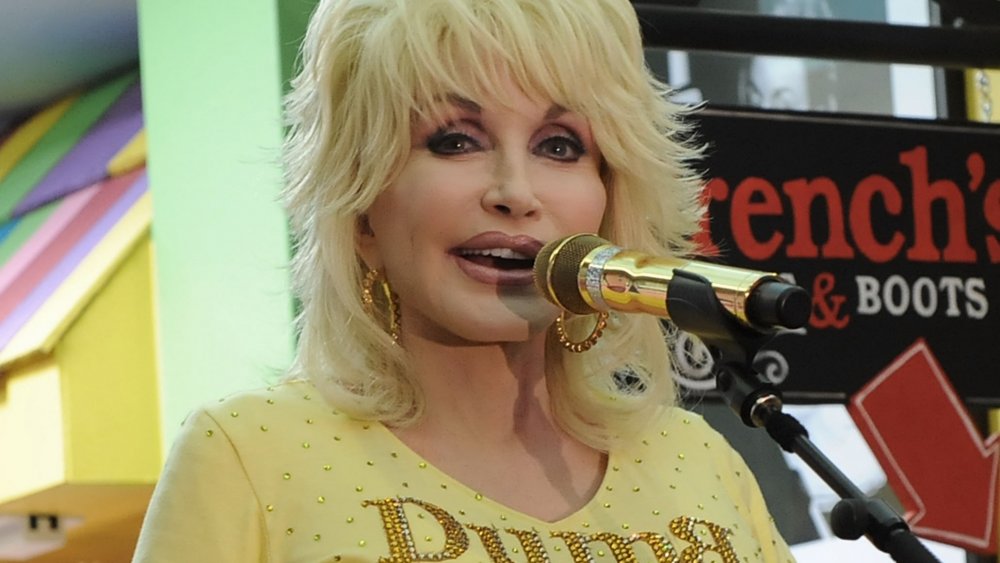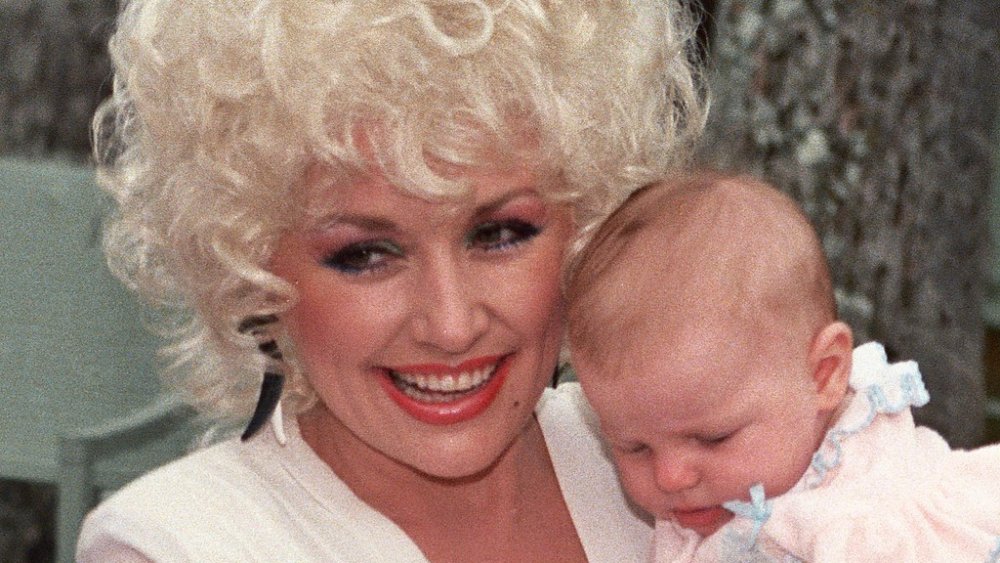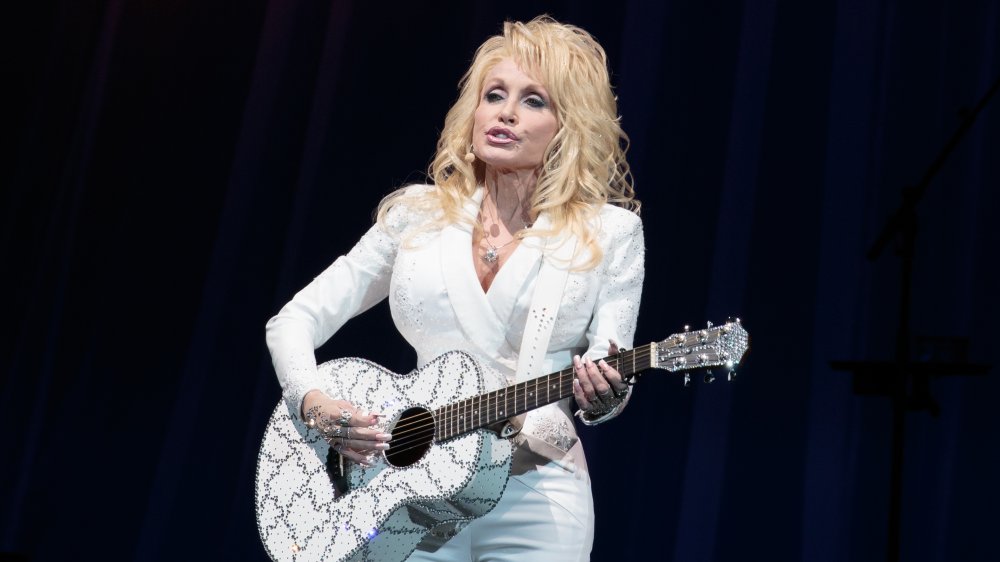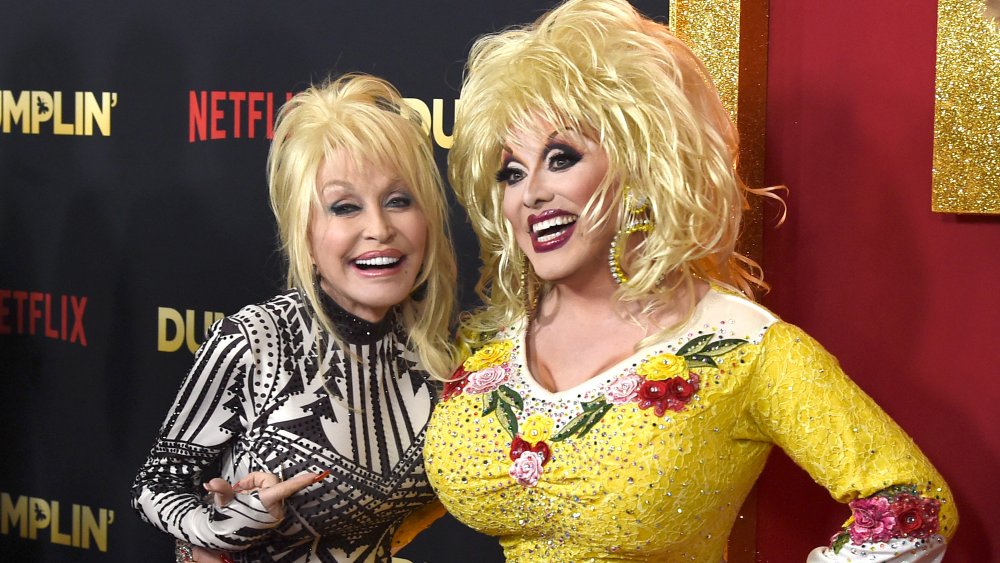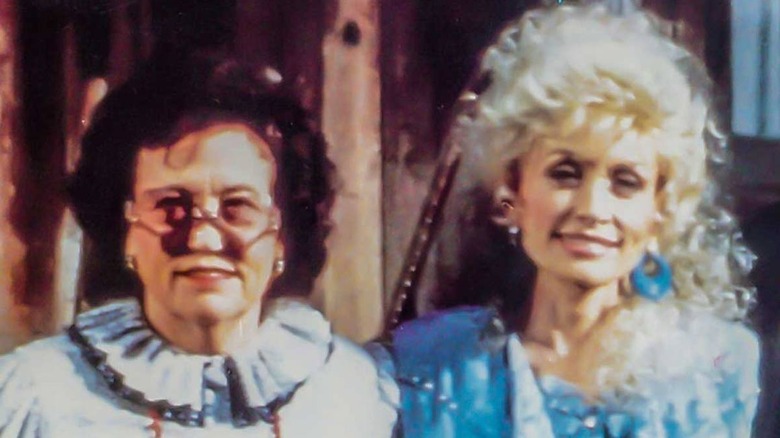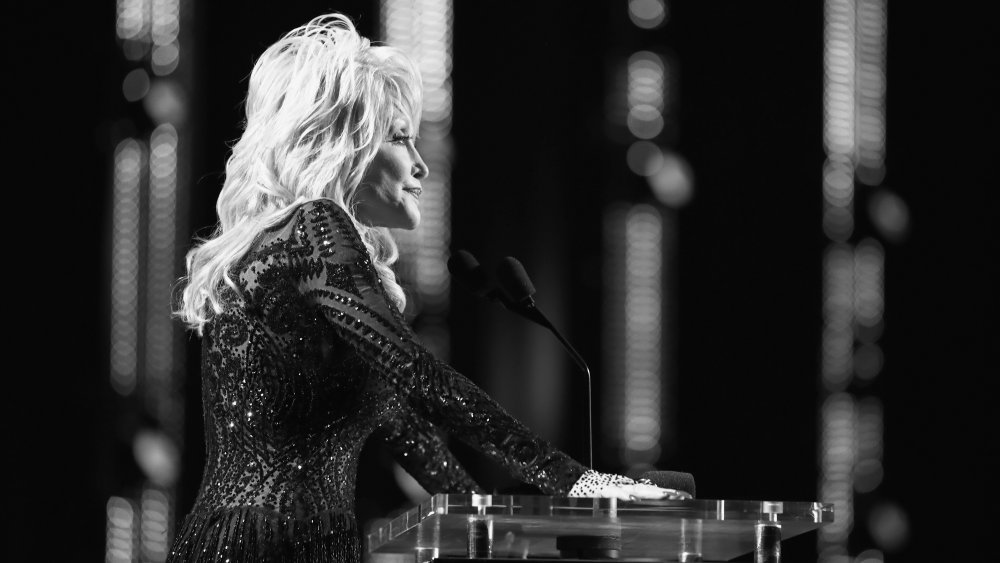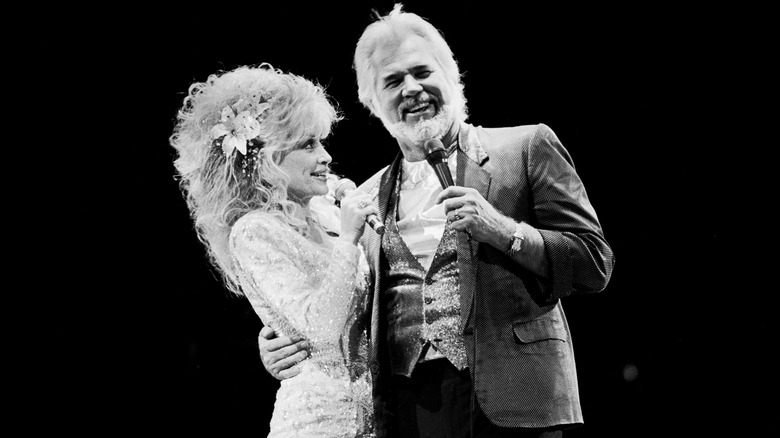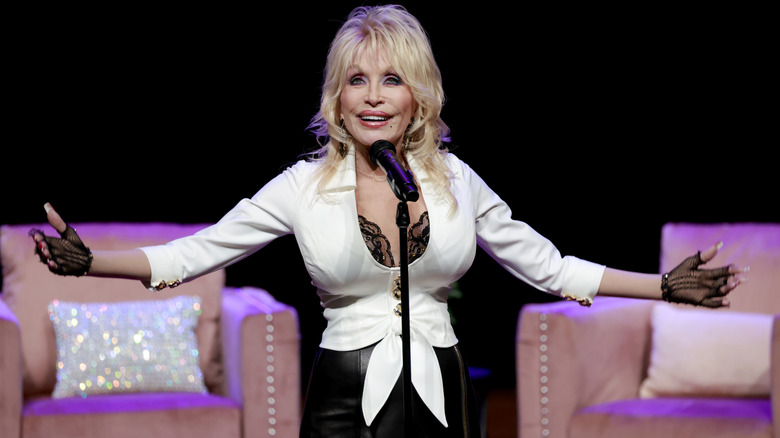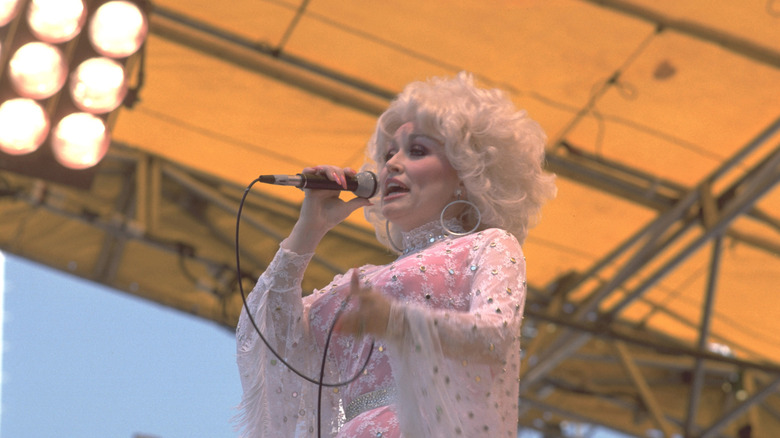The Tragic Real-Life Story Of Dolly Parton
Dolly Parton is a country music legend and an American institution. She's also a quadruple threat. She sings, writes, acts, and directs, and she's that rare celebrity who is simply impossible not to love. She's Betty White in rhinestones, Bob Hope in a 40DD bra. (Incidentally, according to E! Online, Parton's most famous assets are insured for $600,000. Not quite J. Lo. booty numbers, but still.)
Like many of the characters she's portrayed on the big and small screen over the years, Dolly Parton is whip-smart, incredibly funny, and pretty well self-made. She escaped a really rough start in life by the power of her pen and the off-the-charts wattage of her dimpled smile. One thing is for sure — Dolly Parton has encountered a number of challenges and tragedies in her full life, but the country legend has proven over and over again that she's more than capable of healing herself.
Dolly Parton's good old (bad old) days
Dolly Parton was born in 1946 in Pittman Center, Tennessee, in a one-room cabin, the fourth child of an illiterate sharecropper and a housewife who birthed 12 kids before she turned 35. According to an MSN look at her early life, as a girl, Parton was often peed on in the bed she shared with her younger siblings. She never got up to alert her parents or change the sheets because the warm urine was a welcome change from the frigid cold she often experienced at bedtime. Bathing could likewise be a nightmare. In the summer, Parton and her brothers and sisters washed in a nearby river, using soap they made themselves. In winter, everyone had to make due with a shared tiny pan of water.
Parton isn't bitter about her hardscrabble roots. In fact, she told People magazine that she's grateful for the lessons her parents taught her in thrift and financial responsibility. "No matter how much money I make," she said, "I'll always count my blessings quicker and more often than I count my money."
And her wild and free-ranging childhood in the Appalachian Mountains has provided endless songwriting inspiration. One of her first big hits, "Coat of Many Colors," tells the story of a coat a mother lovingly sews for her daughter out of donated rags. The coat draws mockery from the girl's schoolmates, but she knows that, while her family might be short of money, they're long on love.
Dolly Parton lost her younger brother Larry
Growing up in a large family meant that Dolly Parton and her 11 siblings were often charged with taking care of one another. Parton remembers each older child being given an infant to take care of. Little Larry Parton was her responsibility. He was born in July 1955 when Dolly was just 9 years old. It was her job to get up with him in the night and rock him, to feed him and change him when he needed it. She considered Larry her baby. Her overworked mother, Avie Lee, trusted Larry to Parton's care. That made it all the more devastating for Dolly when Larry died just four days after he was born.
Larry's death was a tragedy for the whole family, but it hit Dolly particularly hard. All these decades later, she can still recall the heartbreak she felt when "her" baby passed away, and she's never quite gotten over the loss.
She almost lost her toes in a childhood accident
The ability to walk is something many people take for granted, but imagine how much more difficult it would be after losing several toes. That's something that country music icon Dolly Parton doesn't have to think very hard about, because it nearly happened to her after an accident in childhood.
Appearing on "The Dr. Oz Show" in 2017, Parton recalled that painful incident, which took place when she was 6 or 7 years old. "I had jumped across the fence onto a broken mason jar and cut three of my toes, just my little toes on my right foot, almost off, and they were just kind of hanging there," she said, as reported by People. Too cash-strapped to take her to a doctor, Parton's mother took the situation into her own hands. "So they grabbed me up and all my dad and my brothers, they had to hold me down," Parton added. "Momma, she put cornmeal — now, you're a doctor, you might know, I think the cornmeal was to absorb the blood."
That, however, was just the beginning of her mother's attempt at some DIY, kitchen-table surgery. "They put kerosene on it for antiseptic and momma took her sewing needles — she used to make our quilts and stuff, and she literally had to sew my toes back on," Parton said, detailing the procedure — which, she revealed, miraculously did the trick. "But they worked and they healed and I'm still walking on them," she declared.
She's still saddened by the Christmas when everyone received a present except her mother
Dolly Parton's television specials are typically celebratory affairs, full of music and happiness. On occasion, though, Parton will pull on viewers' heartstrings by recounting a sad incident from her impoverished childhood.
She did just that during her "Holly Dolly Christmas Special" back in 2020, recalling one Christmas when their local church gave out small presents to the poorer families. "Even the grown-ups, the women, and you know, especially the kids," she recounted. However, because Parton's mother had so many children, the person handing out the gifts told her she wouldn't be getting one herself, so that all of her children would receive gifts.
"I saw Mama over there sittin' on the bench crying," Parton said, revealing she went over to comfort her, even offering her mother the present that she was given. "She said, 'No, no, honey, I don't want yours. But I love you because of your good heart.' So because of Mama, I've always tried to have a good heart," Parton shared.
Her grandfather was physically abusive and left her fearful of eternal damnation
While Dolly Parton was growing up in rural Tennessee, she became entranced with a local woman who wore tight skirts and high heels, with bright red lipstick and low-cut tops. While their neighbors had dubbed her the "town tramp," Parton saw a style icon. "When people would say, 'She ain't nothing but trash,' I would always say, 'Well, that's what I'm gonna be when I grow up,'" she told The Guardian.
Her grandfather, Jake Owens, was a preacher in their local church, the House of Prayer. When Parton followed through on her promise, her grandfather despised seeing her dressed in such a manner. He'd punish her for it, sometimes even beating her. That, however, was the price she was willing to pay in order to express herself. "I'm very sensitive, I didn't like being disciplined — it hurt my feelings so bad to be scolded or whipped or whatever," she explained. "But sometimes there's just that part of you that's willing, if you want something bad enough, to go for it."
Meanwhile, her grandfather's sermons also left an imprint on young Parton — and not necessarily in a good way. "I remember the hellfire and brimstone he used to preach and how I used to be real scared of that," she recalled in an interview with Rolling Stone. "You kind of grew up in a horrid atmosphere about fear of religion. We thought God was a monster in the sky."
Dolly Parton lost her treasured guitar in a fire
Throughout her childhood, music was interwoven into the daily life of Dolly Parton. "Music was such a part of our whole family ... I took my music real serious," she said in an interview with Your Tango. "I was always plucking along on somebody's instrument," she recalled.
That did not go unnoticed by her uncle, who owned a small guitar that she loved to play. As she became more focused on singing and songwriting, he made a decision that would change her life. "When he saw how serious I was about my music, he gave me his little Martin guitar, and that was my treasure."
She played that guitar throughout her childhood and adolescence, and it remained among her most valued possessions. "When I left it home when I was 18 years old, I put it in the loft because it was beat up, and when I got money — when I got rich and famous [laughs] — I was going to have it fixed up." That plan, however, never did come to fruition, due to an unforeseen accident that claimed her beloved instrument. "But the loft burned [down] and burned up my little guitar," she recalled, "so I only have the neck of that one."
She went from bluegrass to bubblegum and back again
Parton learned to love music from her mother's side of the family, and much of her knowledge of gospel, country, and bluegrass came courtesy of her maternal grandfather, a Pentecostal preacher. According to an interview she did with NPR's Terry Gross, she started writing songs at the tender age of 7, got her first guitar at 8, and began performing on television at 10. The day after she graduated high school, she left her home in the Appalachian Mountains for Nashville in the hopes of pursuing a singing and songwriting career in the country music capital of the world.
The road to success rarely runs smooth, and Parton, who wanted to record country songs, was shoe-horned by her label, Monument Music, into the pop genre because executives thought her looks and voice ill-suited to country. This despite the fact that her songs all had the unmistakable twang and storytelling genius of Tennessee's eastern hills.
It took some time, but she was eventually allowed to make the kind of music she wanted to, and her debut country single, "Dumb Blonde," made it to No. 24 in the charts. The hits kept on coming, and, in 1967, Monument released "Hello, I'm Dolly," an album that made it clear once and for all that Parton was always more bluegrass than bubblegum.
She was rejected on the road
In 1967, following the release of her debut album, "Hello, I'm Dolly," Parton was hand-picked by Porter Wagoner, a bonafide Nashville star, to appear in his television variety program and in his road show. Wagoner was immediately impressed and bewitched by the 20-year-old Parton's beauty, brains, and talent. She found it more difficult to win over his fans, however. They were used to seeing a songstress named Norma Jean by his side. Norma Jean bowed out to get married. Hey, it was a different time ...
Anyway, Parton did not get a very warm welcome in her first few appearances on the show. A number of audience members actually greeted her by chanting Norma Jean's name.
It didn't take long for Parton to win over Wagoner's most loyal watchers, though, and she helped take "The Porter Wagoner Show" to the top of the television ratings. At the height of their fame, Parton and Wagoner were drawing a weekly viewership of 3.5 million, and their duets — including "Just Between You and Me," "The Last Thing on My Mind," and "Just Someone I Used to Know" — are considered some of the best coed efforts of the country music genre.
Breaking up is hard to do for Dolly Parton too
This may come as a surprise to fans of Dolly Parton and Whitney Houston, not to mention the '90s diva-meets-her-match drama "The Bodyguard," but the tear-jerking ballad "I Will Always Love You" isn't really about a romantic love affair at all but a professional partnership that had run its course.
In 1974, Parton was 28 years old and intent upon pursuing a solo career, but that meant breaking with her long-time mentor, collaborator, and friend, Porter Wagoner. She'd been appearing on his television show for years and, for Parton, it was long past time to go out on her own. She'd planned to remain on the show for five years; she'd lasted seven. She'd paid her dues. Wagoner disagreed. In fact, he was distraught over her decision to leave and tried to talk her out of it. Parton has claimed she tackled the situation the best way she knew how — by writing a song. After confronting Wagoner, she went home and wrote "I Will Always Love You." The next day, she performed it for him, and, deeply touched, Wagoner let her go.
It would be nice to end the story right there, but Wagoner went on to sue Parton for breach of contract. The two feuded for years before calling a truce and ending up friends. True to the song, she was by his side when he died. We're not crying. You're crying.
She 'cried all night' when Col. Tom Parker kiboshed Elvis recording one of her most treasured songs
Long before "I Will Always Love You" became a monster hit for legendary singer Whitney Houston, Elvis Presley had the opportunity to land a single on the charts by recording the Dolly Parton-penned song. Sadly, the world never got to hear Presley's distinctive pipes belting out the now-classic track, thanks to the shenanigans of Presley's shady manager, Col. Tom Parker.
According to Fox News, Parton told BBC Radio 1 that Parker approached her about his client recording the song. However, he also made the same demand he'd given other songwriters whose songs were recorded by the King of Rock 'n' Roll: She would have to hand over half of the songwriting royalties to Parker. Parton recognized what that would mean for her but also balked at giving up something that she'd worked so hard to achieve. She told him, "This is the most important copyright in my whole publishing company, and I can't do that," admitting she was "heartbroken" that Presley wouldn't be singing her song.
"I cried all night. I mean, it was like the worst thing," she told CMT (via Business Insider). "You know, it's like, 'Oh, my God ... Elvis Presley.' And other people were saying, 'You're nuts. It's Elvis Presley. I mean, hell, I'd give him all of it.' I said, 'I can't do that. Something in my heart says, don't do that."
Dolly Parton had a behind-the-scenes husband
Dolly Parton met her husband, Carl Thomas Dean, on her very first day in Nashville. The two ran into each other outside the Wishy Washy laundromat when Parton was 18 and Dean 21. Dean was struck by Parton's pretty face. Parton liked how sweet and shy Dean was. Two years later, the two tied the knot in Ringgold, Georgia, with only Parton's mother and the preacher in attendance. The wedding was a rushed affair, partially because Parton's label, Monument Music, worried that becoming a wife could stall her career. Parton, never one to be told what to do, decided to elope with her sweetheart. Her mother made her a dress and a bouquet, and Parton and Dean found a small Baptist church that would take them on short notice.
Parton and Dean, who ran an asphalt company, were married for nearly 59 years until his death in 2025, but it wasn't always easy. At a 1966 BMI dinner where Parton received a songwriting award for "Put It Off Until Tomorrow," Dean told his wife she'd have to attend such events on her own from then on. He wanted nothing to do with the entertainment business, and remained true to his word. Parton, who often described her husband as a romantic, admitted to CNN in 2019 that he had only seen her perform live a few times and wasn't really a big fan of her music. "I'm like his little girl, I think," she said. "He just worries about that."
An onstage collapse led to surgery that prevented her from having children
By 1984, Dolly Parton was on the top of the world career-wise. But when it came to emotionally and physically, it was a different story entirely. "I went to the very bottom as far as my emotions and my health are concerned," said Parton, via the book "Dolly on Dolly." "See, I was 35 when I first got sick. And I was getting away with murder. I wasn't watching what I ate, wasn't conscious of nutrition, wasn't taking care of myself. I was working hard, and underneath I was a pile of personal and emotional problems."
That all came to a head during a performance in Indianapolis, when she shocked fans by collapsing onstage. "All at once I fell apart," she said. "It was stomach problems and female problems — all-over health problems actually." Doctors discovered she was bleeding internally. That led to a diagnosis of endometriosis, which required surgical intervention. She underwent a partial hysterectomy, which saved her life but also prevented her from ever having children.
Over time, Parton has taken on a sanguine view about the motherhood she would never experience firsthand. "I always say God didn't let me have children so that all kids could be mine," she said in a 2023 interview with Saga.
She endured decades of sexual discrimination
Coming up in the Nashville country music scene in the 1960s and '70s, Dolly Parton was been no stranger to sexist attitudes, ranging from sexual discrimination to outright harassment. "I've certainly been harassed in my life. I've certainly had to put up with a lot of BS," she told Elle, admitting that she considered herself fortunate to have the wherewithal to deal with those situations in her own way. "I was always strong enough to walk away from it and not to have to fall under it," she explained.
That said, one big reason behind her decision to end her musical partnership with Porter Wagoner was the sexist attitudes he cotinually displayed toward her. "He was very much — I don't mean this in a bad way, so don't play it up that way — but he very much was a male chauvinist pig," Parton said in a 2008 interview with the Los Angeles Times. "He was in charge, and it was his show, but he was also very strong-willed. That's why we fought like crazy, because I wouldn't put up with a bunch of stuff."
She was written off as a 'dumb blonde'
Maybe it's because her first big hit was "Dumb Blonde," but for years people dismissed Dolly Parton as a large-breasted, small-brained ditz, enslaved to plastic surgery and the spotlight. Even Barbara Walters, that famous feminist, asked Parton in a 1977 interview if perhaps Parton's penchant for sky-high wigs and bling-encrusted dresses wasn't keeping people from taking her seriously. Walters even went so far as to suggest that Parton was a joke, a punchline. But the thing about Dolly? She's smart. She's funny and brilliant and quick on her feet. She also knows how to build an empire. Don't believe us? Ask Forbes, which estimated her net worth at $450 million in 2024. Who's laughing now? Dolly is, all the way to the bank.
Of course, Parton would be the first to say that money isn't everything. That's true. And it's also true that she never thought of herself as a pretty girl, so she piles on the makeup and the high hair and pours herself into high heels to enhance what God gave her. But you also can't argue with the kind of success she's achieved, or with her colorful comeback to Barbara Walters' wrong-headed condescension: "I can afford to piddle around and do-diddle around with makeup and clothes and stuff because I am secure with myself."
Dolly Parton is a mother to many (but not her own)
Growing up in an impoverished family of 12 children, Parton often mothered her siblings. Later, when she moved to Nashville to pursue a singing and songwriting career, she brought a number of her brothers and sisters and their children to live with her, mothering again. When she married Carl Thomas Dean in 1966, the two lovebirds talked about having children. Parton told The Guardian that she and her husband wondered what their kids would be like — would they be tall like him or petite like her? They threw names around. Like any young couple, they dreamed. But nothing happened. Parton's child-bearing years came and went, and she and Dean eventually faced the fact that they would never have children of their own.
According to interviews she's given, Parton is very much resigned to her childlessness. In fact, she celebrates it. If she'd become a mother, she's not sure she would have been able to tour as she has and to become the star she was probably always meant to be, not to mention a mother figure to thousands of children all over the world who have the privilege of reading her children's books, enjoying her songs meant for young listeners, and benefiting from her charity, Imagination Library, which has donated more than 200 million free books to kids.
Dolly Parton considered ending her life
Dolly Parton is without a doubt an optimist. Anyone who's had her kind of rags-to-riches story would be. But there was a time when she got so low she contemplated ending her life. The dark period came in the early '80s when she had what, in the book, "Dolly on Dolly: Interviews and Encounters with Dolly Parton," she called "an affair of the heart." Parton was married at the time, and the emotional cheating sent her into a deep depression. The fall-out from the affair led her to unhealthy eating, which gave rise to a number of health issues. She was also juggling family drama at the time, had been receiving random death threats, and had just finished filming "The Best Little Whorehouse in Texas," an experience she described as a "nightmare." She canceled a spate of performances and bowed out of the entertainment business for two years.
At one point, she found herself considering suicide. Then her dog, Popeye, came running up the stairs, and the pitter patter of his nails shocked her back to reality. She considers Popeye's appearance at that pivotal time as a message from God and credits her own brush with rock bottom with helping her understand the often-desperate plights of others.
If you or anyone you know is struggling or in crisis, or needs help with an eating disorder, contact the relevant resources below:
- Call or text 988 or chat 988lifeline.org
- The National Eating Disorders Association website or contact NEDA's Live Helpline at 1-800-931-2237. You can also receive 24/7 Crisis Support via text (send NEDA to 741-741).
Dolly Parton was targeted by the KKK
Dolly Parton was, for a long time, infamously apolitical. According to a Rolling Stone interview, she and the very liberal Jane Fonda made sure to stay far away from politics while on the set of "9 to 5" in order to keep the peace. Over time, though, Parton has had politics thrust upon her, namely in the area of gay rights. In the 80s and 90s, she became a gay icon and a go-to for drag queens around the world. Since then, she has embraced the gay community in a myriad of ways, including speaking out in support of marriage equality and transgender rights. Her support for, and popularity in, the LGBTQ community helped inspire fans to organize a so-called "Gay Day" at her Dollywood Theme Park in Pigeon Forge, Tennessee. That move invited the ire of the Ku Klux Klan, whose members protested the unofficial event and periodically rattle the singer with death threats.
Parton is not one to be intimidated by hate groups. She told the New York Daily News that if she were gay, she would "have come out of the closet, just a'flyin'."
The tragic reason she was forced to face off against her mother in court
Dolly Parton's fans have heard a lot about her mother, Avie Lee Parton, both in her songs and in her candid interviews. Understandably, those fans would have likely been confused when headlines in 2001 declared that the country music icon was squaring off against her beloved mother in a courtroom.
As the Houston Chronicle reported, the situation was far more nuanced than headlines let on. Parton, joined by all but two of her siblings, alleged that their mother — then 77 years old — was no longer capable of managing her affairs. Their efforts to prevent her from spending money without oversight, and to take away her driver's licence, were opposed by Avie herself, backed by her twin children, Floyd and Freida Parton. Despite Avie's protestations, Dolly and her siblings wanted to appoint a conservator to manage their mom's affairs.
That court battle dragged on. Sadly, the whole thing ultimately became moot when Parton's mother died in December 2003, at the age of 80.
A month of mourning
Dolly Parton has known her share of loss. Her partner and one-time mentor, Porter Wagoner, died in 2007 at the age of 80. She lost her brother, Floyd, in 2018. Floyd was 61. And she knew death early. When she was 9 years old, her infant brother, Larry, with whom she had a special bond, died just four days after he was born. Perhaps one of the most tragic losses in a long line of them has been that of her niece, Tever Parton, who died at age 36.
Just a month prior to Tever's death in March of 2017, Parton saw the passing of her manager, Don Warden, whom she met in 1967 on the set of "The Porter Wagoner Show." Warden died at age 87 of natural causes. Parton responded to Warden's death with the perfect line, which, of course, she wrote herself: "I will always love you."
A rollercoaster ride (literally)
When Dolly Parton opened her country-western theme park, Dollywood, she did so with history in mind. The land the park stands on has a storied past, having served as an attraction in the Pigeon Forge area since 1961 when it was the Rebel Railroad. Later, it became Goldrush Junction. Parton bought the property in 1986, added a number of new attractions, including a chapel and a rocking porch theater, and the rest is herstory. Dollywood has become one of America's most popular theme parks. It has also seen a spate of serious injuries, leading to lawsuits and bad press.
The most recent of these lawsuits was brought by a mother of two who claims that her experience on the RiverRush water coaster ended with partial paralyzation. According to TMZ, the woman was propelled off her seat and stuck her spine on a hard surface. In 2018, she sued Parton for $2 million.
Another such case put the spotlight on Dollywood's safety record in 2014. A woman fell and struck her head on the pavement while exiting the Waltz Swinger ride. She reportedly suffered spinal and neck injuries, as well as a broken jaw, and sued for $475,000. The two parties settled out of court.
The death of frequent duet partner Kenny Rogers hit her hard
Dolly Parton's aborted partnership with Porter Wagoner propelled her to stardom, but it was a mega-hit duet with fellow country star Kenny Rogers that really sent both their careers into the stratosphere. The 1983 single "Islands in the Stream" simultaneously held the No. 1 position in Billboard's pop, adult contemporary, and country charts.
After Rogers' tragic death at 81 in 2020, Parton couldn't maintain her composure when addressing the loss of her musical collaborator and dear friend during a televised interview with WATE 6. "I loved Kenny with all my heart," Parton declared, her voice wavering as she became overcome by emotion. "My heart's broken, and a big ol' chunk of it has gone with him today. And I think that I can speak for all his family, his friends, and fans when I say that I will always love you."
She concluded the interview — which was being conducted remotely from her home — by displaying a photo of herself and Rogers. "So I know you're as sad as I am," she added, visibly tearing up as her voice quivered even more. "God bless you, Kenny. Fly high, straight to the arms of God," she added. "And to the rest of you, keep the faith."
She revealed the sad truth behind her tattoos
Arguably one of the most noticeable quirks in Dolly Parton's fashion sense is the way she tends to cover the tops of her hands, wearing fingerless gloves. Sometimes made of lace and often flesh colored, these gloves have become part of her signature style in recent years. Meanwhile, fans have also wondered why Parton wears long sleeves all the time.
There's been much speculation about why she wears them, with some theorizing that their purpose is to cover tattoos. Speaking with Vanity Fair, Parton confirmed that she is tatted up, and explained the somewhat sad reason underlying her ink. "Most of the tattoos, when I first started, I was covering up some scars that I had, 'cause I have a tendency to have keloid scar tissue, and I have a tendency where, if I have any kind of scars anywhere, then they kind of have a purple tinge that I can never get rid of. So mine are all pastels, what few that I have, and they're meant to cover some scars."
As she told W Magazine, it's that tendency toward scarring that made her want to get tattoos in the first place. "I've had surgeries for different things, and if the scars didn't heal properly, I just gotta put tattoos to take the sting out," she said.
Dolly Parton's husband, Carl Dean, died in 2025
Dolly Parton's husband, Carl Dean, died on March 3, 2025, at the age of 82 (via AP). The announcement came from Parton's Instagram page, which said, "Carl Dean, husband of Dolly Parton, passed away March 3rd in Nashville at the age of 82. He will be laid to rest in a private ceremony with immediate family attending. He is survived by his siblings Sandra and Donnie."
Parton also provided a statement on the death of her beloved husband in the same post: "Carl and I spent many wonderful years together. Words can't do justice to the love we shared for over 60 years. Thank you for your prayers and sympathy," she wrote.
As of this writing, no cause of death has been released.
